Diary from the frontline
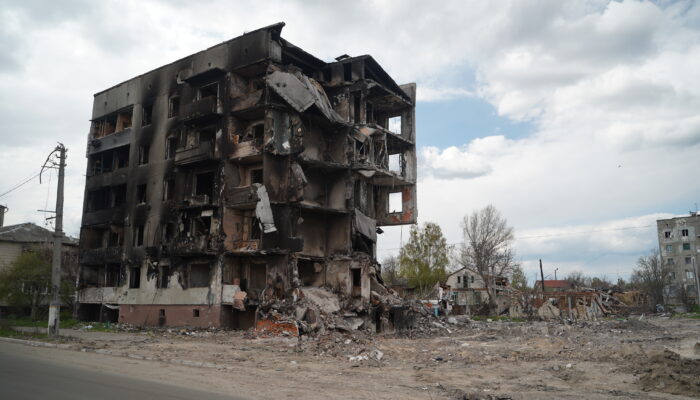
New update
Sunday, 5th of November
It has been a long time since I wrote the last message from Odesa. Much is happening but at the same time not much is changing. The war rages on with heavy fighting at the frontline that is causing hundreds of casualties, if not more, among troops on both sides. But the frontline itself did not significantly move over the last few months. And with winter coming, not many changes are expected for the next few months either.
Winter is expected to be harsh for the Ukrainian people as Russia will increase its attacks on power stations to further destroy the energy systems.
For our local partner organizations preparing for winter has been a number one priority. Distribution of solid fuel and emergency house repair in Kherson province is what we will support over winter. This will mainly reach elderly or disabled people as they are the ones who have stayed behind in the villages.
The war rages on with heavy fighting at the frontline that is causing hundreds of casualties, if not more, among troops on both sides.
Monday, 6th of November
Not a quiet night with incoming missiles and Shahed drones to Odesa. Fortunately, no severely wounded or deaths. Off late, it has been a bit calmer in Odesa, that was targeted by Russian missiles for weeks in a row.
All port and grain storage facilities here in the south of Ukraine were attacked after Russia broke with the “grain deal” this summer. The aim was to further destroy Ukraine’s capacity to export grain. But Ukraine was able to drive most of the Russian Black Sea fleet away from the ports in Crimea. And we can now see sometimes ships with grain passing by the Odesa shore.
Tuesday, 7th of November
One night in summer a drone was shot down by the Ukrainian air defence and the remnants fell on our apartment block. The roof got damaged, and the blast caused windows to blow out. The house owners of our block have themselves organized the repair and by now there is not much that reminds of the damage done during that night. The roof has been replaced, well in time before the rainy season started and the windows and window frames in the staircase as well. Life continues; people are strong here.
Life continues; people are strong here.
Wednesday, 9th of November
Our distribution of medical supplies to hospitals along the frontline has almost finished for this year. Hopefully, before the 1st of December, we will have delivered all emergency kits, medical equipment and medicines to over hundred medical facilities.
After the 1st of December a new decree for the import of humanitarian aid will be introduced by the government of Ukraine. This is part of an effort to prevent corruption, which is of course a good step, but it makes the work for our logistic team in The Hague much more complicated. Next supplies will come in at the beginning of 2024 and we will have time to adapt to the new system.
Thursday, 10th of November
We have two last trucks with medical supplies to come to Ukraine. One got stuck at the Polish-Ukrainian border where a strike of Polish workers and truck drivers has caused enormous delays. Today we got word that the truck could pass! One more to go.
Friday, 11th of November
A meeting with the Mines Advisory Group. We are supporting their demining work in Ukraine already for over a year. In September we visited the training of new teams of deminers in Kropyvnystky. It was impressive to see men and women concentrated at work to learn all the skills for this risky but oh so needed job. Back then it was still hot and very difficult for the candidates to stay focused for hours in a row. During our meeting today we discuss further cooperation between our organizations.
I write my notes on a recent visit to our partner Support, Protection and Care (SPC). This is a small organization working in Odesa province for women in difficult circumstances. We have supported their activities with hygiene kits and first aid kits. SPC does not do big distributions but organises meetings with women in the different villages and then follows up at an individual level.
Saturday, 12th of November
By the end of December, I will finish my one year in Ukraine. So, it is time to prepare already for handover. The weekend is a good time to think that over. But first a visit to the gym. It is important to stay fit.
By the end of December, I will finish my one year in Ukraine. So, it is time to prepare already for handover.
———————————————————————————————–
Week 35
Monday 28th of August
What programming is needed in times of a war that seems to be dragging on and on?
The Monday always starts with the team meeting. We are in Odesa now since January and some things start to be more of a routine. So, it is time again to sharpen our thoughts. What programming is needed in times of a war that seems to be dragging on and on?
Wednesday 30th of August
Today I visit the distribution of an Odesa partner. It is close to our office, just a short walk. Youth Movement partner started in 2006 and focused on HIV/AIDS and especially the LGBTQ+ community. Ever since the start of the war they included displaced people in their activities; Odesa right now hosts some 115.000 displaced. The distribution is small and well organised, beneficiaries come one by one at a certain time slot. No standing in line here. They all receive a food parcel and a hygiene kit. While most of the attention of aid organisations goes to areas close to the frontline, it is important that displaced people do not get forgotten. For many of them living conditions are still very harsh.
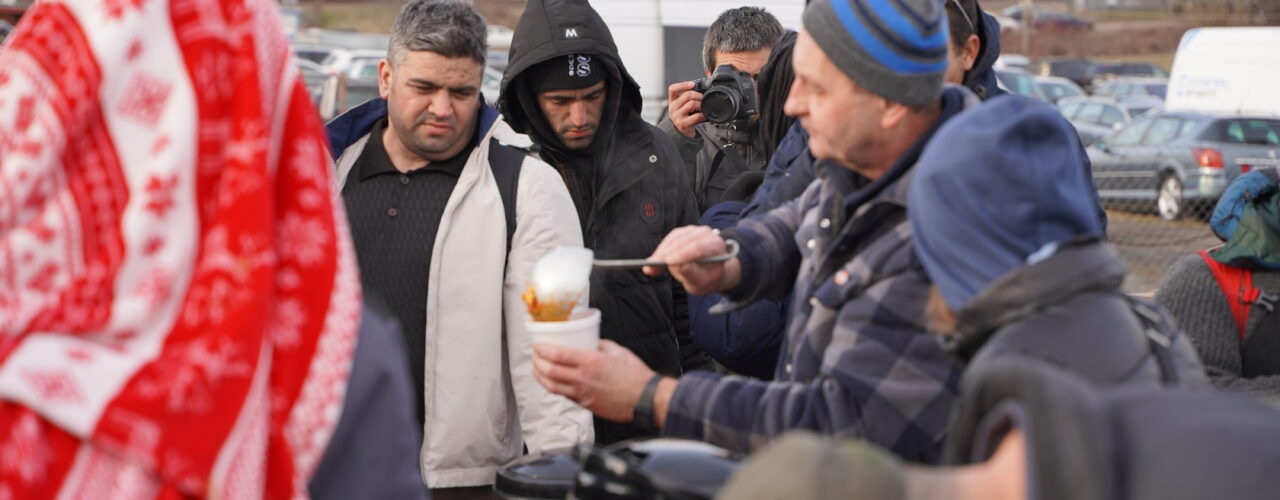
It is important that displaced people do not get forgotten.
Thursday, 31st of August
A trip to Mykolaiv, together with Karine, the medical coordinator, to discuss with the deputy governor of the oblast (province) the possibilities for cooperation on a programme for non-communicable diseases and mental health. It is a long meeting but in the end we agree on the next steps. I will not forget the exclamation of the head of the health department who was present as well: “no mobile clinics, please no mobile clinics!” It seems many NGOs have proposed or started a mobile clinic programme, which is less suitable in Ukraine that despite the war still has a functioning health system.
Friday 1st of September
An online conversation with another partner: Save the World, together with programme officer Lisa. Save the World implements a successful programme for repair of houses that were damaged by the war in the Mykolaiv oblast. And while the current programme is still ongoing, we speak today over Teams about a possible new phase.
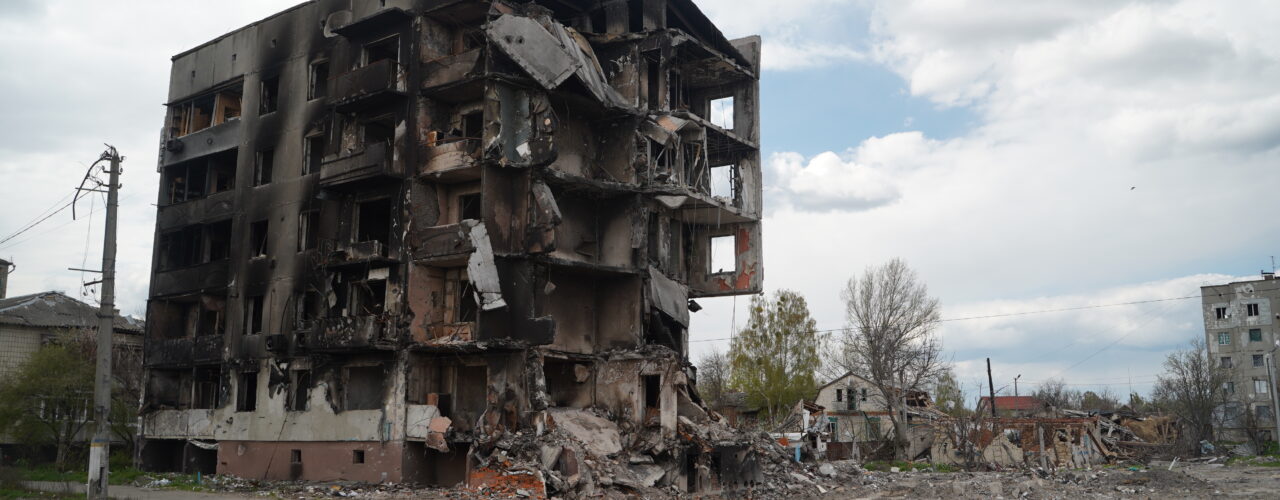
Wednesday 6th of September.
I attend a meeting with the Kyiv based director of INSO, which stands for International NGO Safety Organisation. INSO provides statistics on security incidents, advise if asked for and organises security training. While I am in the meeting, Volodymyr our logistics and security officer attends one of their trainings. SV has only a small team in Ukraine and the support of INSO in security issues is for us very valuable.
Friday 8th of September
All morning waiting in our office for a partner organisation that did not come. This organisation is way overdue with reporting to SV, and we want to support them in getting the reports done. As today did not work out, I make a new appointment for next week.
In the afternoon Kim, relief coordinator and I visit a food distribution in Youzhne, about an hour drive from Odesa. The distribution is for displaced people and vulnerable groups. In Youzhne many people lost their job as work in the Odesa harbours has become scarce since the start of the war. The organisation we work with is also called Youzhne. They are well connected with the communities living in the small town. An important reason for choosing to work with them.
Saturday 9th of September
Finally, a visit to the famous Odesa opera. Before the orchestra starts, we were told that in case of an air raid alert everyone has to go to the shelter under the building. If the alert lasts more than one hour the performance will be cancelled. All remained quiet though.
Before the orchestra starts, we were told that in case of an air raid alert everyone has to go to the shelter under the building.
———————————————————————————————–
Week 34
Tuesday 22nd of August
Back in Dnipro. This time we visit the emergency rehabilitation work of our partner U-Saved in the Kharkiv region and in the Donbass. We, that is programme officer Lisa and me. U-Saved is an off-spring from a French initiative but is now completely Ukrainian run. The communication with them has been difficult at times. So, we are happy to visit their work. Today we drive first from Dnipro to Kharkiv. There we meet with Volunterska, which is the implementing partner for U-saved in the Kharkiv region. We see their small warehouse where it is impossible not to notice that Volunterska is a supporter of the Ukrainian army. Then all together we go to a village called Dovgenke; 1,5 hour drive from Kharkiv and close to the Russian border. Dovgenke before the war had 800 inhabitants (some 200 houses). Not one of these houses is untouched. The frontline has gone back and forth here at least 15 times and as a result literally all houses have been damaged or completely destroyed. Ever since the liberation some 12 families came back to Dovgenke; U-saved and Volunterska support them with roofing and windows. It is all in: they deliver the materials but also provide the teams that actually do the rehabilitation. In between, people live in their summer kitchen or in a shed that was untouched. We meet some of the people who came back, among them Irina who lives here with her husband. They had four sons. One of them died in the attacks on the village. His grave is in the garden, covered with flowers.
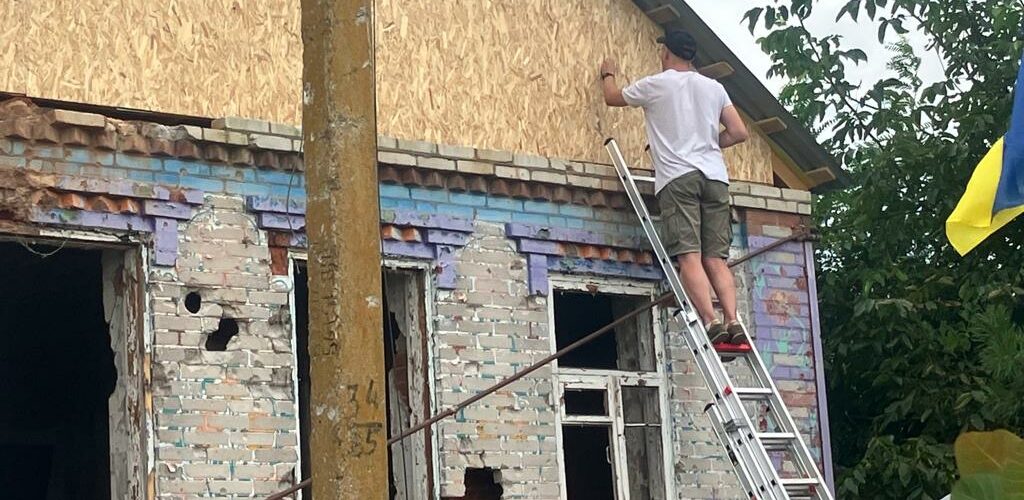
The frontline has gone back and forth here at least 15 times and as a result literally all houses have been damaged or completely destroyed.
Wednesday 23rd of August
We go to Donbass. We visit Kramatorsk and Swyatogorsk. Here U-Saved implements directly without partner. As these places are closer to the frontline, they can only do basic emergency rehabilitation in Donbass. No replacement of full roofs but just closing the gaps with plastic or other material. And no glass for the windows but wood as a cover.
In Swyatogorsk we have a quick look at the beautiful monastery (lavra) that is situated on the other side of the Severodonetsk river. Our visits for the day are done. The original plan was to also go to Kostiantanyvka but we have to skip this visit as Kostiantanyvka is these days is under heavy shelling. It gives us time to sit down with the team from U-Saved and exchange experiences. We compare how we work with partners. As SV we always work with subgrants and contracts. U-Saved provides its partners with materials, pays their wages or volunteer incentives but does not make a sub-grant with its partners. We conclude that sub-granting gives more freedom to the partner but also comes with many requirements like proposal writing, making a budget and reporting.
Thursday 24th of August
No visits planned as it is Ukrainian Independence Day and extra Russian attacks may happen. We return to Odesa by car. We pass endless fields of sunflowers. Some still in bloom, others already drying out, waiting for the harvest in autumn.
Back home we find out that the roof of our own apartment block is being removed as it was too badly damaged in the missile and drone attacks of the 14th. For the moment plastic sheeting prevents the rain from coming in.
Friday 25th of August
We receive extra funding for our medical supplies programme. Great!, we can serve more hospitals near the frontline with surgical kits, medicines and essential equipment. We want to order fast as lead times are long.
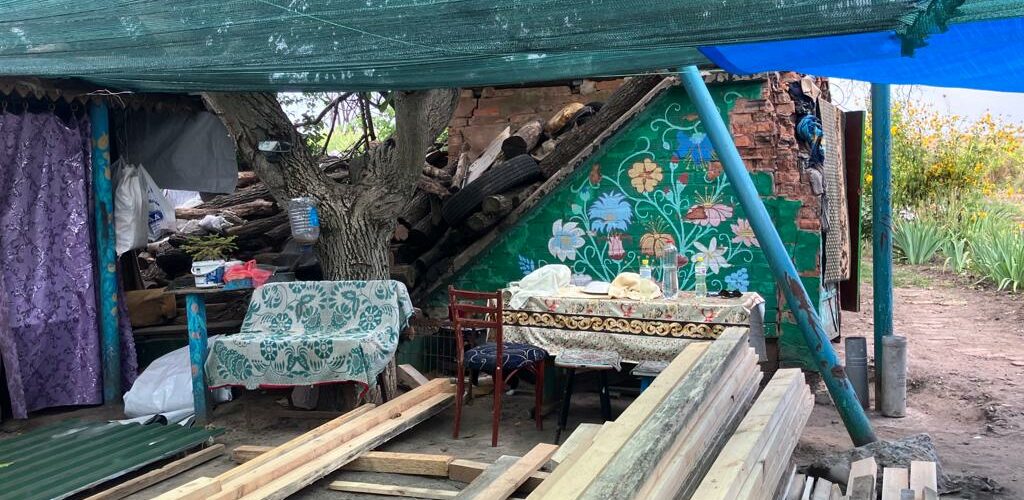
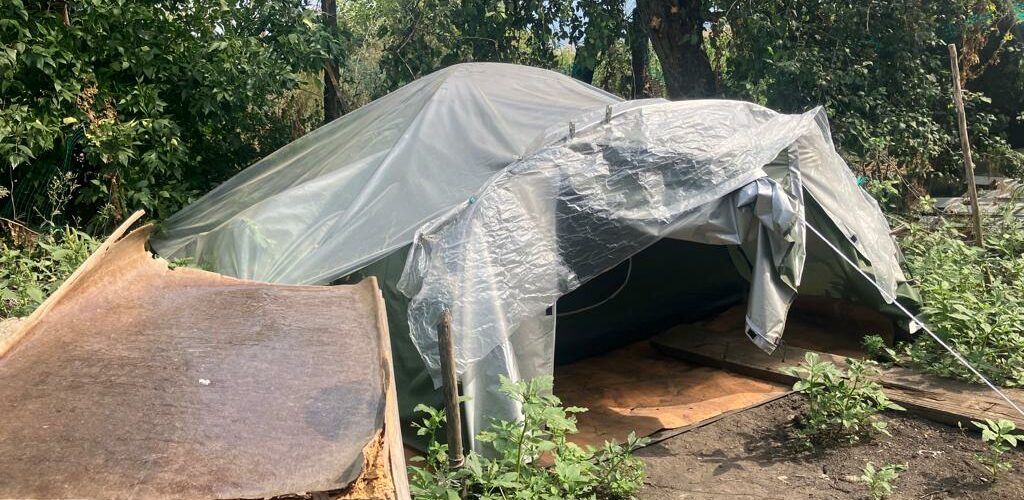
Saturday 26th of August
Some rest and recreation in Odesa. We visit the literature museum, which appears to be pretty empty. Maybe because of its location, close to the harbour that is often attacked. The lovely sculpture garden that belongs to the museum is untouched though. Later we go to the Philharmonia that has a programme of newly composed Ukrainian music. Music never stops.
———————————————————————————————–
Week 33
Monday 14th of August
Another night of missile and drone attacks on Odesa. The Ukrainian air defence shot down all 15 drones and 8 missiles. One exploded in the air above our housing block. The bang caused windows to crash and falling debris damaged roofs and cars. All neighbours came out of the house to sweep the glass, to talk and to take shelter when a new air alert was sounding. Men, women, children, some of them still babies on the arm of their parents.
Travel to Dnipro with our partner INTERSOS. INTERSOS is implementing a rapid response programme that assists people staying within 20 km from the frontline. The security near the frontline areas is worsening though due to the Ukrainian counteroffensive and the Russian reaction. As a result, it is not easy to find a destination where we can visit tomorrow.
Tuesday 15th of August
We depart early morning from Dnipro towards Slovyansk. When we come to Kramatorsk we have to make a detour as Kramatorsk has just been hit by a missile attack. We see the smoke from the distance. From Slovyansk we head direction Lyman, but security does not allow to get close to Lyman. We stop at a parking lot and meet the head of the public health centre of Lyman. We handover the kits with drugs for hypertension, diabetes and cancer. The doctor explains us that he returned to Lyman immediately after the liberation in autumn last year. Now the Russian army is getting closer again. Many people have left the area. It is mainly elderly and disabled people that have stayed behind.
Then we go back to Slovyansk for a distribution of food parcels to elderly by a last mile delivery partner of INTERSOS, the Angels of Salvation. The distribution was nicely organized with a place in the shade and water for the people that are waiting. Not a luxury as it is very hot in Slovyansk. After we visit the warehouse of the Angels. It is huge and well organized. The Angels of Salvation started their activities shortly after the Russian invasion. They were mainly running evacuations from areas under pressure of the Russian army. Ever since they have grown quickly and now have a staff of 105.
INTERSOS is one of the few agencies working so close to the frontline. Still in some cases it is only the last mile delivery partner that does the distribution of the parcels. In the end it is always the Ukrainian organisations that are prepared to take more risks.
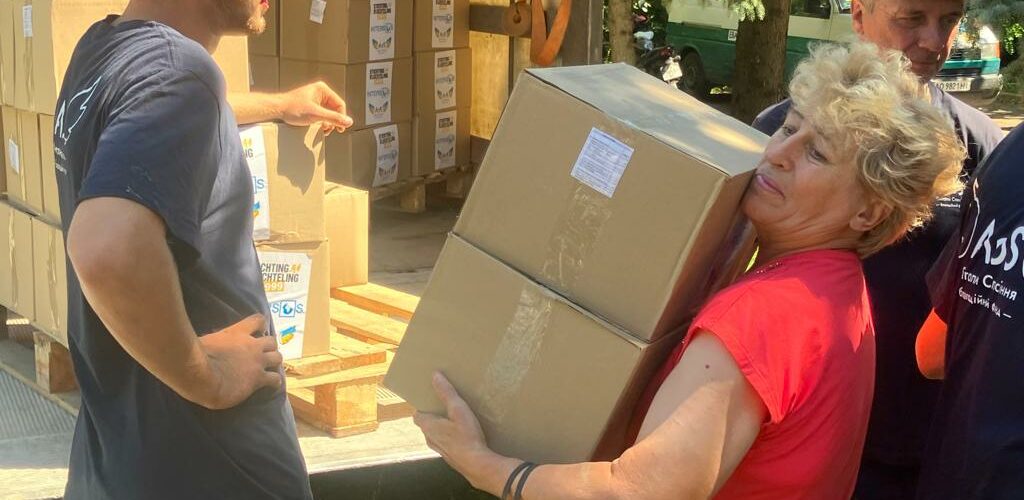
Wednesday 16th of August
I take advantage of my presence in Dnipro to visit nearby Novomoskovsk where we support two hospitals in the medical supply programme. One of the hospitals is tasked to evacuate wounded military personnel. It is impressive to hear them tell about their work. One can feel the pressure that they are under. Every day many new patients coming in. They get their first surgery in Novomoskovsk and then go for further treatment to hospitals in the west of the country.
In the afternoon we visit one of the 18 shelters that have received assistance from INTERSOS in the SV supported programme. I was a bit shocked about the conditions. This shelter is intended to host people for the next 4 to 5 years. But it offers not the beginning of privacy. It has big dormitories, and only two shower blocks and 1 kitchen for 100 people. The shelter has received much support including from SV/INTERSOS, but still it is not sufficient to provide a better living than this.
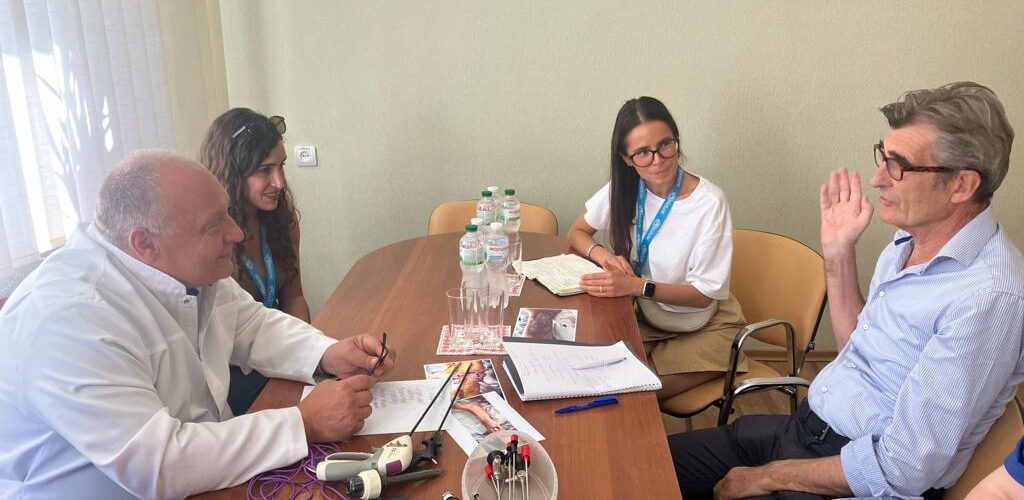
Thursday 17th of August
On the way back to Odesa we stop in Kriviy Rih to see another INTERSOS supported shelter. This is actually a home for elderly where 25 places were reserved for displaced elderly. It looks friendly. We provided the oven in the communal kitchen. The apple cake that the cooks just baked looked great.
Friday 18th of August
Concluded a memorandum of cooperation with one of our logistics partners here in Ukraine for delivery of emergency burn kits to hospitals in cities that suffered from missile and drone attacks. Hopefully, we can start soon.
Saturday 19th of August
A long walk along the Black Sea. There is a “health path” for walkers and cyclists, nicely in the shade of big trees as temperatures are well above 30 degrees.
———————————————————————————————–
Week 32
Monday 7th of August
As always, I walk from home to the office. It is a 35 minutes walk. When I leave the house, the neighbour is already feeding the five cats that live in our inner court. Probably left behind by people who fled the war. I throw the rubbish in the bins opposite our apartment building. Every hour of the day, even before curfew time (05.00), people are sieving through the rubbish to find something of value. Nothing gets lost. The big empty water bottles we do not throw in the bin. They go to the lady who is sweeping here the streets in the neighbourhood. She has a small business; she grows plants in these water bottles and sells them.
People are sieving through the rubbish to find something of value. Nothing gets lost.
Tuesday 8th of August
Every week we have many questions for headquarters. The cooperation with our direct contacts on finance, human resource or health programme related issues is very good. The main challenge is to keep everybody informed with whom we are not we are not in direct contact on a regular basis. As always communication is key.
Wednesday 9th August
We take a look once more at the upcoming evaluation for the SV Ukraine response. The evaluation is an SHO requirement but is also an excellent opportunity for SV to learn if it has an advantage to have a small country office and if so, what this advantage is. For most other organisations, having a country office is the standard way of working. We will evaluate if the extra costs of such office indeed led to improved programming. Of course, some things we know already. It would be impossible to do the medical supply programme with almost 50 hospitals and medical facilities if not represented in the field. And the same goes for out small grants programme with our Ukrainian partners.
Friday 11th of August
Preparing for next week’s field trip with our Italian partner INTERSOS. We will visit their Rapid Response programme in the Donbass. The itinerary is not yet completely settled due to the volatile security situation. Still hope to depart on Monday.
Sunday 13th of August
Bad news from Kherson again. Renewed shelling attacks on several villages. Seven people died in the attacks. The city and surrounding villages were liberated almost a year ago, but ever since has to endure relentless attacks.
The city and surrounding villages were liberated almost a year ago, but ever since has to endure relentless attacks.
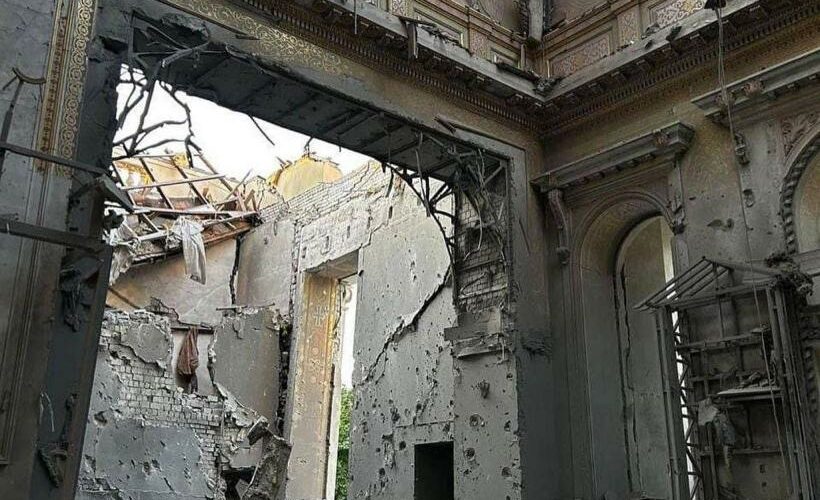
———————————————————————————————–
Week 31
Tuesday, 1st of August
Kherson city is still under daily shelling. Today the Russians hit one of the hospitals in Kherson. One intern dies, it was his first working day in the hospital. Five other staff members get wounded. This hospital is one of the hospitals on the list for the medical supply programme. This round we need to add extra surgical equipment to our delivery. It is the little bit that we can do in response to this tragedy.
One intern dies, it was his first working day in the hospital.
Wednesday, 2nd of August
We discuss with part of the team how we can improve in supporting our Ukrainian partners that want to strengthen their capacities. We conclude that we need a small fund for it that is not immediately tied to the project implementation by the partners. One step further.
Today has reports in the news that in Ukraine tens of thousands need prothesis for arms and legs. It is hard to imagine such number of people. It makes feel sad.
Thursday, 3rd of August
Departure by night train to Kyiv where people of our partner Open Door Ukraine will pick me up. On Friday we will continue our trip to Trostianets by car. Open Door is an initiative of Robert Serry, the first Dutch ambassador to Ukraine back in the nineties. Open Door focuses on early rehabilitation works to apartment buildings, schools and hospitals. Their approach is to never provide for all that is needed, but they make a contribution, while the community itself adds as well.
Friday, 4th of August
Arrival to Trostianets, about 35 kilometres from the Russian border in the Sumy region. Trostianets was occupied by the Russian army in the first days after the invasion. It remained under occupation for a month till a counter offensive of the Ukrainians drove the Russian army out of the city. The damage to houses and buildings is still everywhere to be seen.
Trostianets is a town but also a municipality (hromada) that includes many villages. We are received by the mayor of Trostianets, an incredible energetic man full of plans for rebuilding the town and the surrounding villages. Inside and outside Ukraine he gained recognition for his approach.
Open Door, with SV funding, repaired the roof of a school in the village Soldatske, and provided the furniture and equipment for two new IDP shelters close to the same village. We visit the school that is located only 15 km from the Russian border. The roof has been repaired and looks beautiful. It even has special edges to prevent the snow from falling on children’s heads in winter. But still a lot needs to be done, windows, ceilings, furniture and of course the construction of a shelter. But the mayor is optimistic: the school will be open in September. We meet a teacher and some of the children of the village: they cannot wait.
Then on to the two shelters; both are former medical facilities. They look great, repaired and painted. Most of the furniture, shower and kitchen equipment that Open Door provided has been installed. But the people, that are going to live there, are not there yet. They are expected to come soon as Trostianets still has many internally displaced that live in poor conditions. In a further future these shelters will be homes for the elderly. In Ukraine most elderly stay with their children, but the war has made that impossible in many cases the elderly stayed behind while the younger people fled or are in the army.
But the people, that are going to live there, are not there yet.
Saturday 5th of August
Breakfast with the mayor and a last check on generators that were provided by Open Door in winter. Then back to Kyiv. On the way we speak about all we have seen, about avoiding corruption, about the future of Ukraine and the relationship to the West. Conversations that we all have so often.
Sunday, 6th of August
Early morning arrival to Odesa. I take a taxi home, but the driver decides to make an unexpected detour. He wants to show me the house of an actor that was famous during the Soviet Union. Stalin liked him he adds when he stops in front of the building. Somehow Stalin is never very far away.
———————————————————————————————–
Week 30
Wednesday, 26th of July
Arrival back to Odesa. An early flight from Schiphol, transfer in Vienna and then the bus from Chisinau (Moldova) to Odesa. The train from Chisinau does not function ever since the invasion of Russia into Ukraine, as it passes through the pro-Russian breakaway region of Transnistria.
Thursday, 27th of July
These are busy weeks for the SV Ukraine team. The small grants programme with our Ukrainian partners in the regions of Odesa, Mykolaiv, Kherson and Zaporizhzhia is gaining traction, which means much travel for the relief team and much work for the security officer who prepares and tracks all movements. At the same time new trucks are coming in for our medical supply program that supports hospitals and stabilisation points along the frontline.
Friday, 28th of July
In the evening, the Russian army carries out a missile attack on Dnipro. Our relief team happens to stay overnight that day in the Dnipro. The explosions are frightening close to their hotel.
The explosions are frightening close to their hotel.
———————————————————————————————–
Week 29
Monday 17th of July
It will be another broken week as for personal reasons I once more go back to the Netherlands.
Tuesday 18th of July
We are making the plans for food, non-food and shelter assistance for the rest of the year. Much will depend on what our partners, who know the situation on the ground best, will propose to us. But we also look at our own priorities which is first of all winterization support for the upcoming winter. Preparations really need to start now. And, jointly with our partners, we want to improve our emergency preparedness and response capacity. What are lessons learned of the Kakhovka dambreak in that respect? How can we improve on the prepositioning of funds and supplies? Last but not least, we want to establish a dedicated programme for support to partners that want to strengthen their capacities. We can do this only with a limited number of partners as it requires close cooperation with partners that we know well.
We work with a mix of partners: some smaller grassroots organisations with close ties to the community, while others are larger network organisations with a capacity to deliver substantial programming. In Ukraine there are good partners in both categories, and they are equally valuable.
Many of our partners are shifting to more developmental work. Should we follow these partners? I am convinced we should not. SV is a humanitarian organization and should not venture into areas in which the organisation has no expertise. Of course, reconstruction and development are highly relevant to build Ukrainian society again, but it is important to know the limitations of the support we are able to provide.
SV is a humanitarian organization and should not venture into areas in which the organisation has no expertise.
Wednesday 19th of July
We wake up after a second night full of attacks of drones and missiles and explosions. The Russian army is hitting hard on Odesa after Russia on Monday withdrew from the grain deal. All harbour infrastructure gets pounded. We leave early for the border of Moldova to catch the flight back to the Netherlands. The lines at the border are noticeably longer than usual. It seems people take their precautions.
We wake up after a second night full of attacks of drones and missiles and explosions.
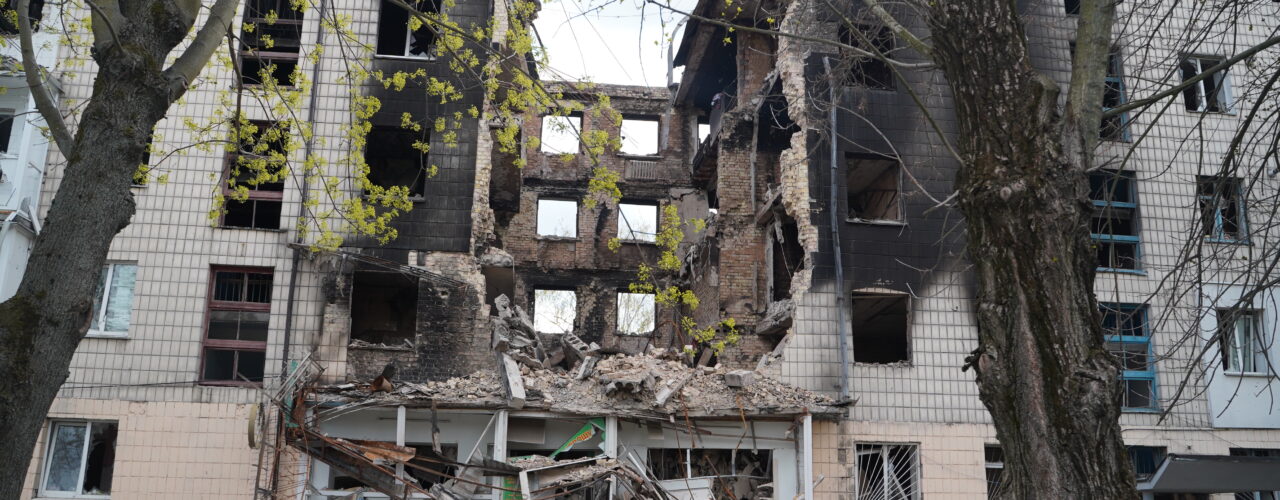
Thursday 20th of July
Planning for our medical supply programme for the second half of the year. Needs are still urgent, especially for surgical kits. Our medical coordinator supported by a contact group of volunteer Ukrainian doctors is in close contact with the hospitals along the frontline. Lead times for some of the items are very long. So, the pressure to order soon is high, but getting in all the request with the right specifications is a very laborious work.
Sunday 23rd of July
Contact again with the Odesa team. Last night Odesa suffered from a horrendous missile attack. This time it was not the harbour that was hit but the city centre including the Transfiguration cathedral. The team is fine, but it is a sad day.
Tuesday 25th of July
Preparing to go back to Odesa. At night watch a “Nieuwsuur” broadcast by Dutch television about medical stabilisation points near the frontline. At some of them we deliver much needed medical supplies.
———————————————————————————————–
Week 28
Tuesday 11 and Wednesday 12
I am travelling back to Odesa. On Tuesday by plane from Amsterdam to Chisinau in Moldova with a stopover in Warsaw. Then on Wednesday by bus from Chisinau to Odesa. It takes five hours by bus including passport and luggage check at the border. Once back in the office it is high time to catch up on some mails. Amongst others, the approval of the procurement of dosimeters for hospitals in the Zaporizhzhia, that need to prepare for possible explosions in the nuclear power plant.
Thursday 13th of July
Water supply systems, cleaning of houses and buildings and provision of hygiene are still the main needs after the Kakhovka dam break.
Kherson coordination meeting. I cannot go this time in person, which is always preferable above online as also the Kherson authorities are always present. To avoid parallel aid systems, it is important to be at these coordination meetings. Water supply systems, cleaning of houses and buildings and provision of hygiene are still the main needs after the Kakhovka dam break. Some of that we can supply through our partners, but the bigger water works are beyond our capacity.
We will start two new projects with two Ukrainian NGOs. One is for repair of houses that suffered from the flooding after the dam break. The other is for a forgotten group villages in Odesa region that house many IDPs. Our partners are new, both relatively small but well connected with the communities where they work. There is always a choice to make between the bigger, more experienced NGOs and the smaller groups that are still largely based on volunteering.
Friday 14th of July
Hopefully many internally displaced people, former soldiers and children will find their way to the centre.
My residence permit is ready. I just had to leave my fingerprints and the permit for one year was mine. The main event today is the opening of a new space by our partner Faith, Hope, Love. This will be a centre for integrated mental health support that includes clinical psychologist, psychiatrist, and family medicine doctors. Some of the staff are displaced themselves from Mariupol and Luhansk. Mental Health is one of the top priorities of the Ukrainian government and one can understand why. But how to provide Mental Health assistance in a meaningful way? So many organisations are involved in mental health or psychosocial support. But the first thing still is to do no harm.
It is very busy at the opening. We can see the love and attention with which the new centre has been furnished and decorated. That is a good start. Hopefully many internally displaced people, former soldiers and children will find their way to the centre.
Saturday 15th of July
Every night there are air alerts and not too far from here the war is raging. But life goes on.
Time to visit the market. Every night there are air alerts and not too far from here the war is raging. But life goes on. The market is open. People are drinking coffee on the sidewalks of the street. On the terrace of one restaurant a training session is going on for new personnel. A bride is having a photo shoot in front of one of the beautiful buildings of Odesa.
———————————————————————————————–
Week 27
Monday 3rd of July
I am back in the Netherlands and will stay for just over a week. As every Monday we start with our Ukraine team meeting. To do this meeting online and from home makes me feel like we are back in corona times. I already miss the small Odesa team.
Tuesday 4th of July
Some good news from Odesa: our medical team has advocated with the World Food Programme for food assistance to two psychiatric institutions here in the south. WFP followed up and included both in the distribution list.
Thursday 6th of July
Tomorrow our relief coordinator will visit the distribution of hygiene items by a partner in Kherson. Kherson is still everyday under shelling of the Russian army and any visit therefore needs thorough preparations by our security officer. Then I need to weight the importance of the visit against the perceived risks. Our Ukrainian partners usually are prepared to take more risks than we do, but this time we decide we can join them.
Friday 7th of July
The team is back from Kherson and arrived in Mykolaiv. Always a relief.
———————————————————————————————–
Week 26
Rumours are getting stronger that something will happen at the nuclear power plant in Zaporizhzhia.
A bit of a crazy week with many smaller and bigger things to take care of. All my good intentions to keep a real diary go out of the window. So, instead it will be a short summary this time.
While Ukraine is still struggling with the consequences of the dam break, but already rumours are getting stronger that something will happen at the nuclear power plant in Zaporizhzhia. Ukrainian authorities are preparing for a very serious incident at the power plant. We are in Odesa 300 km from Zaporizhzhia, but we regularly travel there, and we need to prepare ourselves as well.
Then there are the banking issues. One transfer from the Netherlands to a Ukrainian partner gets stuck, because the bank keeps asking many questions about the partner. Another transfer to a partner gets delayed and as a result the project of this partner starts much later. And we are still waiting for our own Ukrainian bank account that got lost somewhere in bureaucracy.
But we should not complain too much about bureaucracy. For instance, under martial law the import of the medicines and equipment for our Artsenhulp project is quick and easy. The medical supplies are brought within 2 days from the Netherlands to our warehouse in Kyiv; ready for further distribution to the hospitals in the east and south. But the poor truck driver on the way back will face waiting times of up to ten days for his empty truck.
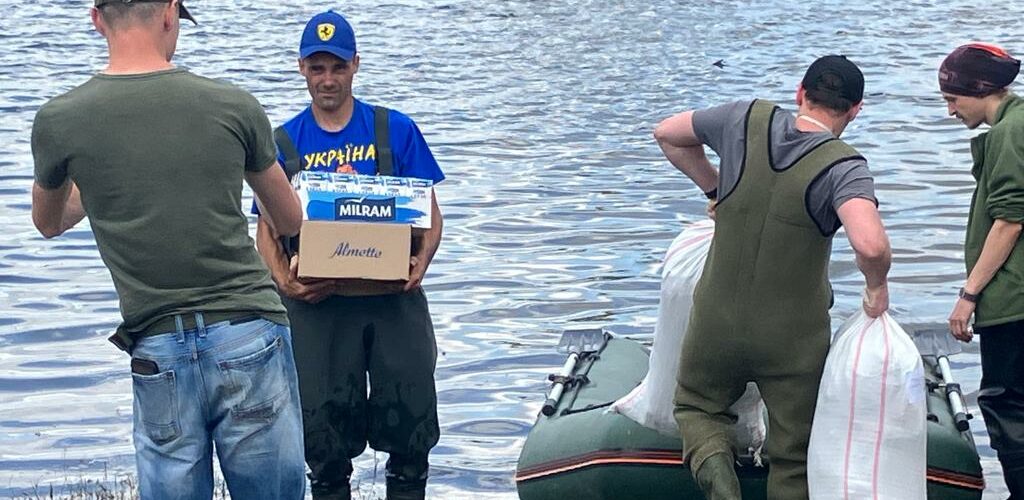
Thursday 29 June
On Thursday I visited a big meeting in Odesa on “Development and partnership” organised by the city of Odesa with a number of national and international ngo’s. In the afternoon there was a panel on ‘localization and humanitarian aid’. In Ukraine, it is very obvious that Ukrainian organisations play the most important role in the humanitarian response. They are the first to respond, they are also the ones that take the most risk in frontline areas. At the same time, they do not get the international funding and support that they deserve. And they do not get the overhead and support costs for their activities that any international NGO would demand to receive from its donors. All of this is true, and it is good that we get remembered. Still, I leave the meeting with an uneasy feeling. The uneasy feeling is that needs of the population at times seem secondary to the debate on localisation of humanitarian aid. Localisation seems to have become a goal in itself and is not seen as a means to reach people in need of assistance in the most effective and appropriate way.
Localisation seems to have become a goal in itself and is not seen as a means to reach people in need of assistance in the most effective and appropriate way.
Immediately after the meeting I am called back to the office. Our landlord wants us to vacate the office tomorrow. They have found a more lucrative deal than with us. I am pretty sure that this breach of contract is not lawful in any way shape or form but there is no point in starting a legal case. Next day we make sure we get our money back and we move out.
On Monday we will have e new temporary office, but I will not be there as for personal reasons I have to go to the Netherlands.
———————————————————————————————–
Week 25
Monday 19 June
Our weekly team meeting. We look back on the response that we did with our partners to the Kakhovka dambreak. We provided bottled water, aqua tablets, cleaning materials, extra medical supplies for the hospitals; while water filters and bed linen are still to be distributed. Is there anything we should do more? It seems that the response of local authorities, Ukrainian volunteers and international NGOs was so vast that we better pause for now.
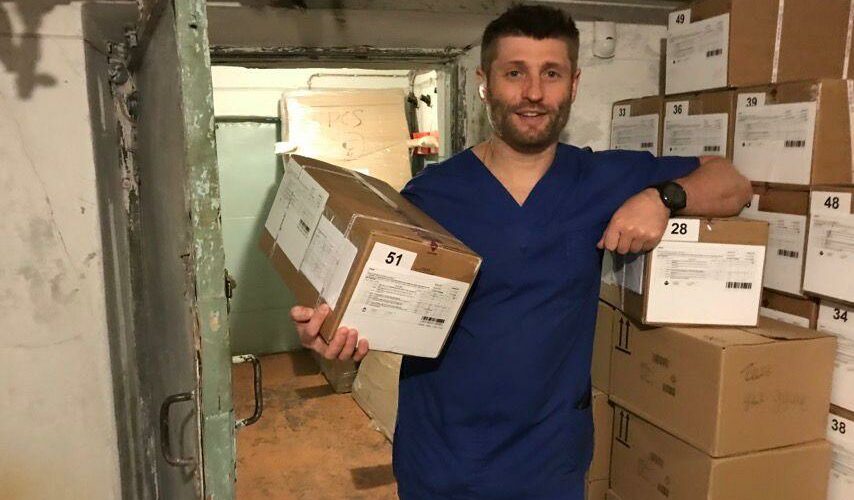
Aid can also be too much.
We also look back to the roundtable with Local Partners that colleagues Kim and Lisa organized last week in our office. The roundtable was to exchange views with our partners on where we can enhance cooperation and in what way SV can better support the partners. It was a lively meeting and a major issue that was discussed is the lack of overhead and support costs that international organisations provide to their local partners. Very often they just receive kits to distribute without any funding for transport or for the staff that is working on the project. SV cannot make up for other organisations that fail to provide this kind of support but we can make sure that we ourselves adhere to principles of good partnership and where possible advocate on behalf of our partners with other international organizations.
Tuesday 20 June
Karine, Viktoria and I go to Mykolaiv, about a two hour drive from Odesa. In Mykolaiv we meet with the health authorities. Stichting Vluchteling has made a priority of programming for Non Communicable Disease and Mental Health in emergencies and we speak with the Mykolaiv leadership about the possibility of cooperation. Before the war, Mykolaiv had a population of 420.000 people. Due to the war many people fled from the town that at a certain moment only counted 200.000 inhabitants. But people are returning, and it is estimated that the population of Mykolaiv is now around 320.000. At the end of the meeting both the Mykolaiv staff and we expressed interest to further explore cooperation. Next Monday the meetings are to be continued.
From Mykolaiv we go to Berezovka hospital. When we arrive, the staff had just finished a training on how to react in case of a rocket attack. A sad reality for the Ukrainian health facilities these days.
The Berezovka hospital is not yet on the list of our medical supply programme, but they contacted us through the French organisation Alima. We get a tour of the hospital by the energetic director; she explains that they have 66 beds of which for now they have to keep 20 beds open in case of an outbreak of cholera as a result of the flooding. The hospital is not forgotten. For instance, the city council of Berezovka financed a whole new operation room and Alima is financing repair works on the building. Still there is plenty of need for SV support. We are able to provide them with sutures within three days; but we are out of surgical kits for the moment and will deliver as soon as they come in again.
Wednesday 21 June
A day in the office.
Before I go, I buy a coffee around the corner. Believe it or not, their name is SHO and their slogan is Coffee is Aid.
The coffee is good, and it helps me through the WHO coordination meeting.
Thursday 22 June, 09:00
Handing in my application for a Residence permit. If everything goes well I will receive the permit on the 12th of July. Back in the office I speak with colleagues Samantha and Lina, both based in The Hague, on the evaluations of the Ukraine programmes that they are preparing for. Our biggest question: how do we ensure that the evaluations will not be a ‘ticking the box exercise’ but will be really useful to learn from as an organisation.
Friday 23 June
The week ends at the INSO office. INSO provides security information to NGOs, and they have noticed an increase in shelling of Kherson city by the Russian army over the last two weeks. Still, it is very busy now with aid organisations in Kherson city. Is this due to the high and worldwide profile of the dam disaster? And then on to the Philharmonia for a great concert. The orchestra starts with a resounding performance of the Ukrainian national anthem. Then try not to get goose bumps.
Saturday 24 June
I am on the twitter feed from early morning.
What is happening in Russia? What is Wagner up to and what will be the consequences here in Ukraine?
———————————————————————————————–
Week 24
Wednesday June 14, early morning
A WhatsApp message on my phone. A friend from the Netherlands asks if I am ok. He read that during the night a rocket hit a residential building here in Odesa. Three people died. Twelve are injured.
Unbearable injustice. But yes, we are ok. In the office we look at the photos. Like we did yesterday when the rockets hit Kriviy Rih….
We that is Karine, Victoria and Vlad and myself. We are permanently based in Odesa. Often, we are joined by Lisa (based in Kyiv) and Kim (based in Brussels). The full team for Ukraine is still bigger: we have Lina, Roel, Willeke and Paul in the Netherlands. And Yulia, Tatiana and Oksana who are based in Oosterbeek, Warsaw and Lviv. They are Ukrainian doctors who keep contact with the hospitals in Ukraine for our medical supply program ‘Artsenhulp’.
Our office in Odesa is in a co-working space. It is the first ever office of Stichting Vluchteling outside the Netherlands. Why did SV start an office in Ukraine? The answer is that we want to be closer to our local partners. It is a big shift in SV’s way of working and we will evaluate carefully if this small but permanent presence indeed has added value.
Wednesday June 14, 14:00
One of our partners wants a derogation for their procurement of relief items in response to Kakhova Dambreak. So, yes of course, please go ahead, we need to be fast now.
Wednesday June 14, 17:30
I have a telephone call with a doctor of one of the hospitals that is in our medical supply program. We are speaking in English as my Ukrainian language skills are hardly existing. They face difficulties with the authorities; unfortunately aid can be a source of discontent and corruption. We try to deliver the medical supplies as direct as possible to the end user. From doctor to doctor and not everybody likes that. Luckily, for now the problems seem solved.
Thursday June 15
Vladimir, driver Serhii and myself are leaving for a visit to the activities of one of our local partners in response to the Kakhovka Dambreak. With our support they procured cleaning materials like shovels, rubber boots and plastic bags for the cleaning of houses and streets. Just to be sure we take our helmets and vests as the Russian forces keep on shelling the flooded areas of Kherson area even while rescue and aid operations are ongoing. We meet the people of our local partner on the road between Mykolaiv and Kherson. They have a small hub there that they run with three Ukrainian NGOs. Volunteers from Odesa, Kyiv and other cities are bringing relief items or are directed by our partner to villages where the need is highest. They have a nice system of communication and coordination between themselves through social media. At the hub we also meet a woman and a man that are wearing weapons. They are from a civilian group. We ask about them as we try to keep our aid efforts separated from the efforts of armed groups, but it is not completely clear why they are there and soon after our arrival they leave. From the hub we go to Fedorivka, where many houses were completely under water. Now the water has come down with three metres. We are invited to enter some of the houses, the water has spoilt everything inside. The river is still very, very wide here. Here and there you can see the top of a tree above the water. The people of our partner go to the other side with a small rubber boat. We are not as the risk of mines floating around is very high. Here we see the difference with our local partners that are prepared to take more risks than most of us, international ones. The boat is small and take a few plastic bags with the names of the beneficiaries already written on them: some clothes, diapers and a little electric oven. It is wonderful to see and at the same time makes me wonder where humanitarian aid ends, and charity begins. Or is there no such difference? It is impressive to see that tiny rubber boat cross that vast area of water to make sure that no one is forgotten.
Just to be sure we take our helmets and vests as the Russian forces keep on shelling the flooded areas of Kherson area even while rescue and aid operations are ongoing.
Friday June 16
Friday is admin day. Report writing for donors and a visit to a company that will support us with all the financial and legal obligations we need to fulfill now that we are officially registered in-country. We speak to the ‘buchhalter’ and the lawyer; both ladies know what they are talking about. It is reassuring to know that they can help us navigate Ukrainian bureaucracy.
Saturday June 17
What does one do in the weekend in Odesa apart from catching up on e-mails? We walk through the park to the sea. Nice to feel the fresh air. It is busy on the beaches; even some people are swimming despite all the warnings for mines and contamination due to the dambreak. We visit some Ukrainian and international friends. We all keep the conversation light but sometimes it slips back to work: the mayor of Odesa that was released three days after his arrest on charges of corruption, the situation in the hospitals in Mykolaiv and of course the villages in the Kherson oblast that suffered so badly from the damburst.
Some people are swimming despite all the warnings for mines and contamination due to the dambreak.
Sunday June 18
Fathers’ day! Lovely message from home!
———————————————————————————————–
| Ton Huijzer works as an independent consultant and is now living in Odesa, Ukraine with the Dutch humanitarian NGO Stichting Vluchteling (SV, Refugee Foundation). | 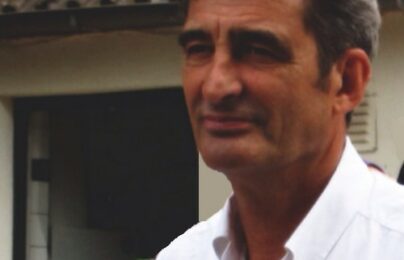 |
Date: Ton started writing a diary from week 24
Author: Ton Huijzer
